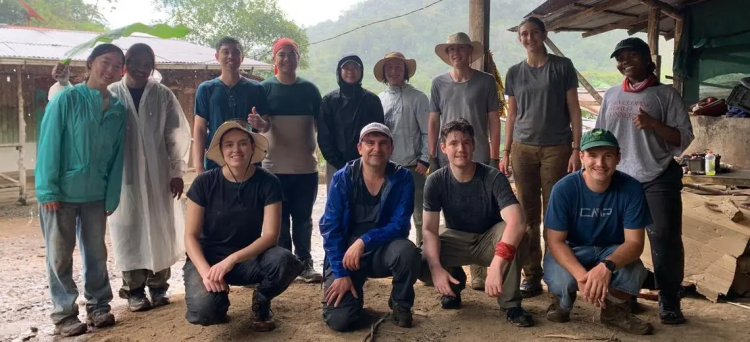Sore muscles, blistered hands, and a week's worth of dirt underneath his fingernails, Caden Kjelgren ushered in his 20th birthday last May doing hard labour on the El Camino de Costa Rica eco trail in the small village of Taus.
Sweating alongside the locals, he and his fellow members of Project90, a student run club formed in the University of Calgary's Schulich School of Engineering, built an aqueduct which would provide clean water to the community.
They worked construction, dug holes, laid pipe, and poured and casted concrete, putting their backs into any manual tasks required to get the job done in the week they had onsite.
Theoretical understanding meets practical application
Going into his third year of mechanical engineering and a project manager on Project90's Costa Rican trip, Kjelgren went into Taus armed with plenty of technical know-how. On paper or a computer screen, for example, he could design the sedimentation tank that needed to be built with excellent academic understanding of how that tank would function.
After his time in Taus, Kjelgren gained a newfound insight. "It was a great experience for our team to see what actually goes on behind the engineering," he says. "Maybe you can draw and design a sedimentation tank, but if you don't know how to build that tank then you only know half the story. It was invaluable for all of us to learn that."
Project90 helps communities cut off from engineering advances
Formed in 2011, Project90 was so named based on the notion that 90 per cent of the world's engineering resources only benefit 10 per cent of the global population. Accordingly, the Schulich club's focus was on creating engineering projects for those less fortunate.
During the COVID pandemic, Kjelgren notes, there was little interest in Project90, and the club almost died. As recently as 2023 it had only 20 members.
Now, thanks to improved marketing, recruitment, and a winning streak of impressive projects, Project 90 is enjoying rapid growth. The club currently has 60 members and in the past year it had over 100 applicants.
The Costa Rican project was made possible thanks to a partnership with the Developing World Connections (DWC), a charity dedicated to international community development. It was this organization that approached Project90 about the assistance needed in Taus.

The members of Project90 along with their Costa Rican friends taking a break from their work in the village of Taus and seeking shelter from the intense rain. Photo Courtesy of Project90
Despite its tiny population of less than 100 people, the village of Taus is a key community on the 280-kilometer El Camino de Costa Rica eco trail which stretches from the Caribbean to the Pacific, weaving through rural communities and indigenous territories. Over the years tourists have flocked to the trail in increasing numbers and while this has been to the economic benefit of Taus, it also put a great strain on the town's water supply system.
"The town's water system was built about 35 years ago, so it was old and deteriorating," says Kjelgren. "Before we came in their water storage tank could only hold about 25 per cent of its intended capacity. That's how badly it had whittled down. So, it was important to develop the water system, not only for the people of Taus but also for the steady stream of tourists who travel through. There's also an education centre in the town where students will stay for weeks at a time."
Many months of planning
Over the past 10 months Kjelgren and his teammates have been in contact with Costa Rican engineers and construction workers, along with members of the Taus community, making plans for the work to be done.
Firstly, the failing water storage tank needed to be repaired. Additionally, a bypass tank was built so that the town could still receive water whenever maintenance was required on the main tank.
Another task involved replacing the sedimentation tank, which remove rocks and debris from the spring water. A second spring water source was also tapped which more than doubled the town's flow capacity.
"The taps would sometimes run dry if there were too many kids in the education centre," says Kjelgren. "Now, with the increase in flow rate, that should never happen again."
Finally, the team improved flow regulation throughout the system by improving the piping layout and sizing.
When the Project90 engineering students left Taus they could be proud of their efforts knowing the life-changing improvements they helped make to the community's water supply system. But they also came away with gifts of their own that went beyond an incredible work experience, touching on something deeper.
In a blog on DWC's website, third year mechanical engineering student Owen Thurbide writes that he felt richly rewarded seeing his team's conceptual plans implemented in ways he hadn't expected. "In contrast to the theoretical knowledge presented in school textbooks, the methods used by the locals were generational and completed by intuition rather than rigid measurements," he observed.
"My interactions with locals working on the village water system has been amazing... Each resident is intimately involved in each process required to make their water, food, and shelter needs. Understanding this interconnectedness has been very significant in appreciating the vital impact that our work is having on the community."
Video Credit: Tammie Samuel, Communications













